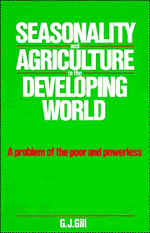Book contents
- Frontmatter
- Contents
- List of illustrations
- List of tables
- Preface
- Acknowledgements
- 1 Introduction
- 2 The sources of seasonality
- 3 Seasonality and the disadvantaged
- 4 Seasonality and the environment
- 5 Coping with seasonality
- 6 Seasonal labour migration
- 7 Special problems of developing countries: I: Market failure and market distortions
- 8 Special problems of developing countries: II. Technological change in a changing environment
- 9 Implications for policy and planning
- Appendix: Seasonal labour migration at the national level: An approach to rapid appraisal
- Notes
- References and sources
- Index
9 - Implications for policy and planning
Published online by Cambridge University Press: 20 May 2010
- Frontmatter
- Contents
- List of illustrations
- List of tables
- Preface
- Acknowledgements
- 1 Introduction
- 2 The sources of seasonality
- 3 Seasonality and the disadvantaged
- 4 Seasonality and the environment
- 5 Coping with seasonality
- 6 Seasonal labour migration
- 7 Special problems of developing countries: I: Market failure and market distortions
- 8 Special problems of developing countries: II. Technological change in a changing environment
- 9 Implications for policy and planning
- Appendix: Seasonal labour migration at the national level: An approach to rapid appraisal
- Notes
- References and sources
- Index
Summary
In Chapter i it was argued that the association between seasonality and poverty could best be understood within the framework of a mean–variance matrix in which, for any one of a number of variables, a low mean value indicates poverty, and a high variance across the year reflects seasonality. It was also argued that over a number of years mean and variance are mutually interdependent, with high variance occasionally tripping a mechanism that pushes down the mean and a falling mean tending to increase intra-year variance. There are two basic linkages at work here. The first is direct. Seasonal variation in income itself imposes costs, which reduce the proportion of gross income available to meet consumption needs. The second linkage is less direct, resulting from the way in which those who are rather better off, in terms of either wealth or social status, are able to pass on seasonal stresses to those who are worse off, either temporarily (by appropriating consumption goods during the hungry season) or permanently (by acquiring investment goods). The policy implications of the evidence presented in previous chapters can best be understood within the above framework, and it will therefore be recapitulated briefly within such a construct as a starting point for the discussion that follows.
Beginning at the happier end of the wealth–poverty spectrum in the Third World, that occupied by the more economically successful among the developing countries, these, like the developed countries, have reduced seasonality of national income by deriving an increasing proportion of it from non-seasonal industries, particularly manufacturing.
- Type
- Chapter
- Information
- Seasonality and Agriculture in the Developing WorldA Problem of the Poor and the Powerless, pp. 214 - 255Publisher: Cambridge University PressPrint publication year: 1991



